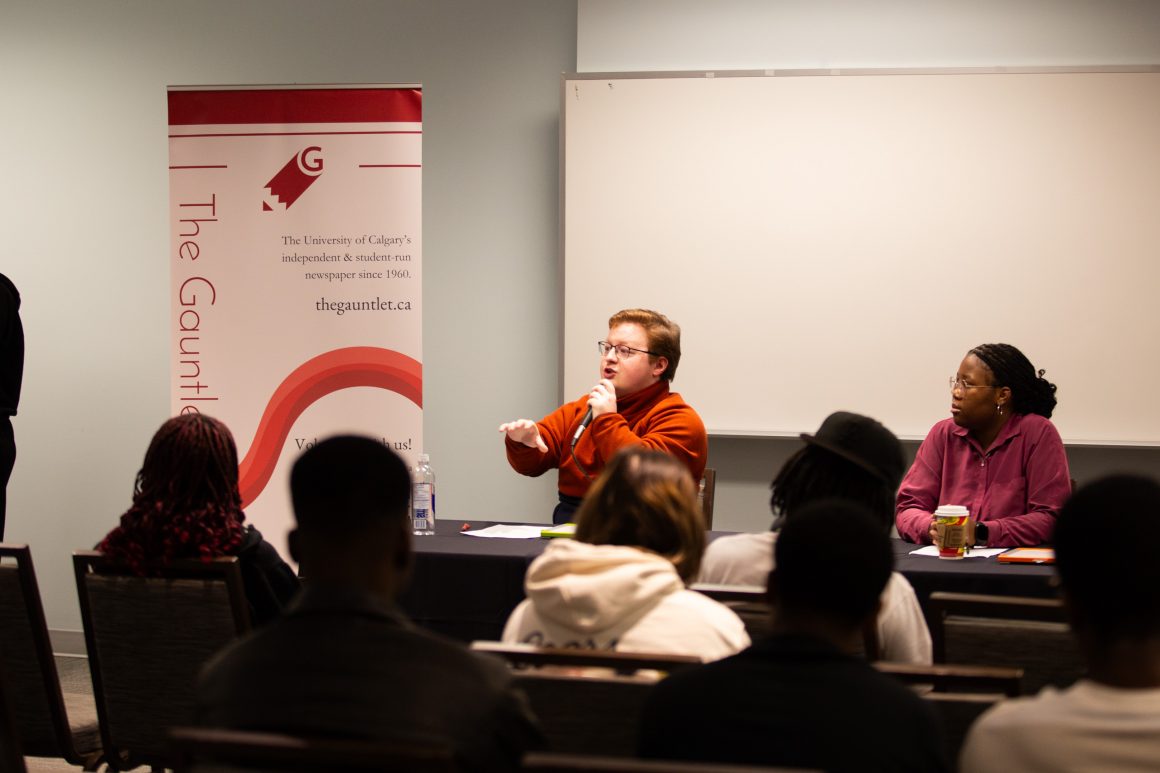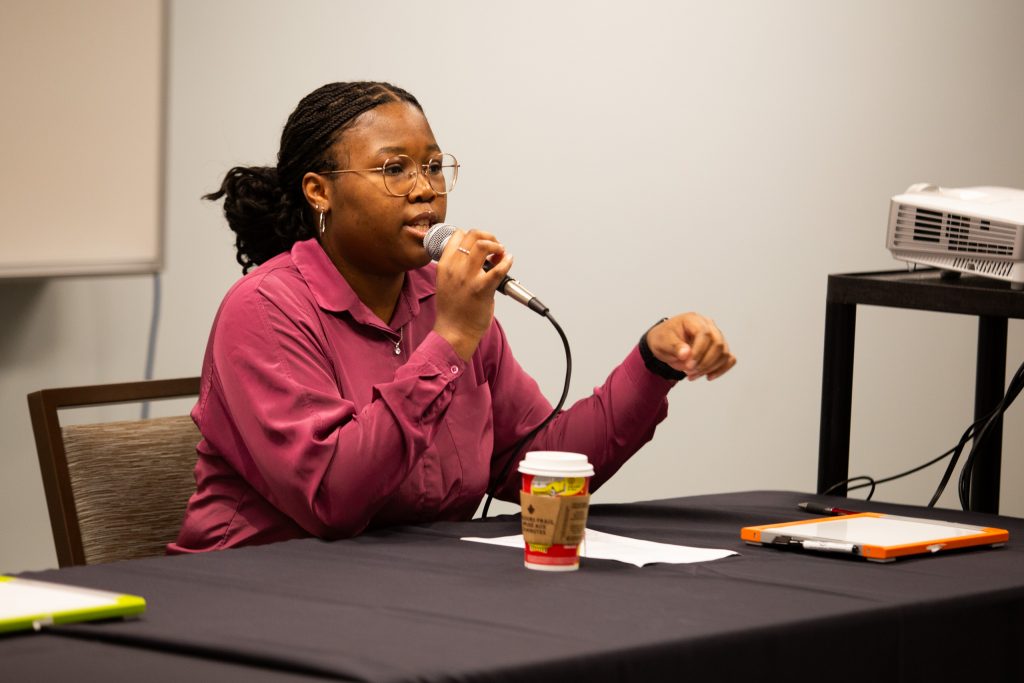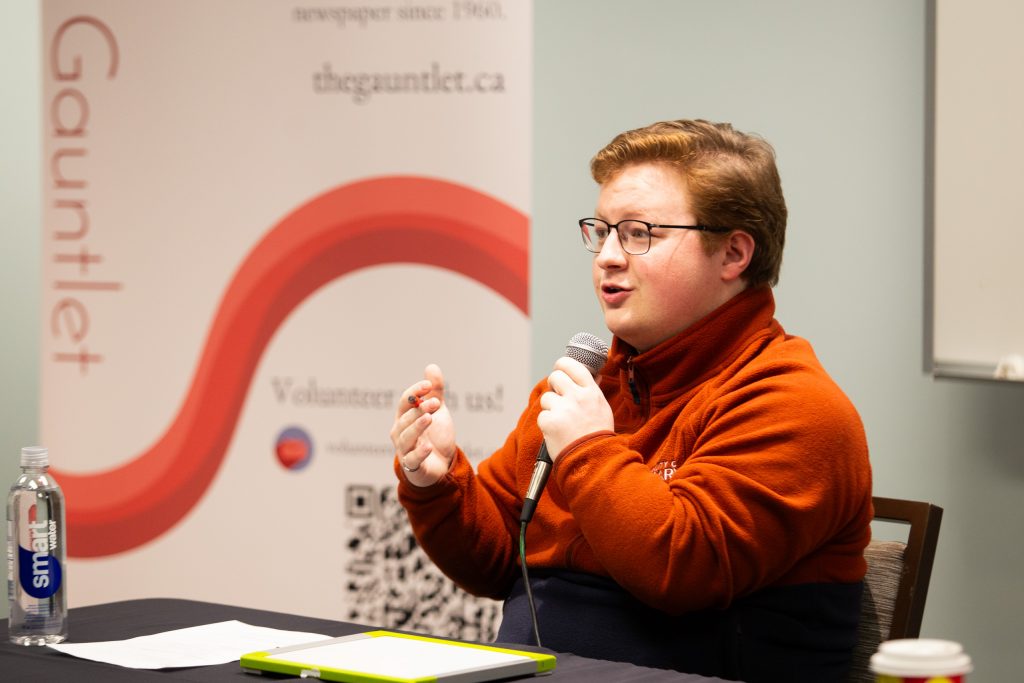
SU Presidential Debate 2025: Bakana and Johnson face off on tuition, advocacy and campus growth
By Imran Ahmed, March 2 2025—
From 2-3 p.m. on Feb. 25, 2025, The Gauntlet hosted the University of Calgary Students’ Union (SU) presidential debate for the first time since the 2019-2020 academic year. The debate was moderated by Editor in Chief of the Gauntlet, Nazeefa Ahmed, and Voices and Features Assistant, Gurshaan Kaur Rai.
The dialogue was divided into three sections. The first section involved specific questions that allowed the candidates to elaborate on their platforms. The second section allowed each candidate to critique their opponents’ platform. The last section was a more light-hearted rapid- fire questionnaire. The debate concluded with an opportunity for the audience to ask questions.
This year, the two candidates running for the highest position in the SU are Naomi Bakana and Matthew Johnson.
Bakana, who started her career with the SU as an Arts Representative and is, was the current VP Internal for the previous term. Her experience within the SU is a strength, with her portfolio of work including the co-founding of the Black Excellence Scholarship. Bakana believes there is room for progress in the SU and wants to continue her contributions as a president.

Although an external candidate, Johnson’s background in a union family and experience as a current executive in the Political Science Association, in which he has led local campaigns, positions him as a qualified candidate. Johnson believes there are gaps in how the SU is currently functioning, motivating him to run for the presidential seat.
Bakana and Johnson are both committed to keeping tuition costs in check, though they differ in their approach. Bakana emphasized tuition caps while Johnson called for a broader advocacy strategy.
“I will work to maintain the two per cent domestic tuition cap and push for an international tuition cap so students have assurance their fees won’t suddenly increase,” Bakana said, focusing on direct policy measures to limit tuition hikes.
Johnson, however, emphasized that limiting tuition increases requires external pressure.

“I plan to use the full weight of the office to create a new strategy to maintain public pressure against tuition hikes and ensure enough staffing at Alberta Student Aid Services so financial aid arrives on time for students,” he said, advocating for a strategy that includes lobbying and public awareness campaigns.
When asked to elaborate on how he plans to apply external pressure and how that differs from Bakana’s cap-focused approach, Johnson described a two-part strategy involving direct student engagement and broader political advocacy.
“Engaging with students is not just about face-to-face interactions — it’s also about connecting with the wider political community in Alberta. This means operating like a union, which involves communicating regularly with people and being active on social media. It’s not just about Instagram for students but also platforms like X, where there’s a larger, older demographic,” Johnson said.
“It will involve going to local political podcasts to explain student issues and how they will impact the near future. It will also include engaging with student newspapers, like the Gauntlet, to discuss our ideas, strategies, and plans for students and how we can approach and communicate with them. It’s an important mixture of the two,” he added.
Bakana was given the opportunity to critique Johnson’s answer. Although she mostly agreed with the goal, she believed the approach was redundant.
“I agree with the importance of exterior pressures and community engagement, but much of this work is already being done. The SU actively uses platforms like Instagram and X to reach students and the broader community, and we’ve seen significant growth in engagement this year. While it’s crucial to continue expanding these efforts, many of these strategies are already in motion and progressing,” she said.
On the topic of the Mac Hall expansion, both candidates agree on its necessity, particularly due to the increasing student population.
Bakana intends to lead a comprehensive plan for the expansion of Mac Hall. She emphasized addressing the lack of space for study, prayer and other resources as the campus grows. Bakana believes there needs to be space for student input, similar to the 2012-2013 initiative where iPads and questionnaires were used to gather feedback on Mac Hall’s design. She also stressed the importance of collaborating with the university, especially with the upcoming renegotiation of the Management Use of Space Agreement (MUSA).
Johnson agreed with Bakana’s points, reaffirming the urgent need to address the lack of spaces on campus for students. He emphasized both short-term and long-term solutions, noting that any Mac Hall expansion would require student approval through a referendum.
In the short term, he proposed using existing spaces by offering them to clubs and student organizations, providing additional space for current students while planning for a more sustainable long-term solution.
The candidates were also asked about their plans for collaboration with other SU executives, specifically which executive position they are excited to work closely with and what they hope to accomplish together.
Johnson expressed his excitement to collaborate with the VP External with the goal of pressuring the government for change.
“One of the big things is working with the VP External, especially when it comes to creating and maintaining public pressure on the provincial government and administration,” he said.
He highlighted the shared goal of increasing communication with outside stakeholders and taking a stronger stance against issues like UCP tuition hikes and budget cuts.
“It’s important that we roll up our sleeves and get in the fight, ensuring students feel their SU is fighting for them every single day,” he added.
Bakana is focused on working with the VP Internal. She plans to address gaps in the sexual and gender-based violence policy, particularly in work-integrated learning environments.
“Sexual harassment is something many students face, and the current policy isn’t all-encompassing,” she explained. “Working with the VP Internal will help push these initiatives forward and ensure the government understands their importance,” she added.
Bakana also noted the VP Internal’s role in the Mac Hall expansion, especially with upcoming renegotiations, for which preparations have already begun.
Before moving on to the rapid-fire section, both candidates were given the opportunity to address any points not previously discussed.
Bakana highlighted her concerns about the scope of Johnson’s platform.
“A lot of things on Matthew’s platform should be delegated to other executives,” she said. “While these issues are important and are what students are asking for, it’s a lot for the SU President to tackle in one year. Things such as prayer spaces on campus fall under the VP Internal’s portfolio and are already being worked on. It’s important to focus on what can be accomplished within a single term. I believe that the goals written in my platform will get done if I’m elected as your SU President.”
Johnson responded by emphasizing the collaborative nature of the SU executive team.
“While this is my platform, we are a team, and the entire SU executive will be working together,” he said. “Whether it’s working with the VP Internal, VP External, or VP Academic, we’ll make sure that student needs are being heard. This is not something that may be fully done in one term, and I may not win every fight, but I promise to do my damn best to fight for you every single day if elected as your SU President,” Johnson said.
Both candidates performed well on the rapid-fire section, which is a good indication of their general knowledge of the SU and the university.
Finally, the floor was opened to the audience to ask the candidates questions. One question involved how each candidate would respond if their advocacy and pressure didn’t yield results, particularly in the context of tuition caps or restoring funding.
Johnson responded by emphasizing the variety of tools available to the Students’ Union.
“In an instance where all efforts and communications fail, we can utilize the meeting of presidents to say, ‘Our communications have broken down. We believe strike action is necessary. Can we reconvene and better understand how the membership would feel about a strike action?’ We’d organize education and training sessions to ensure the strike is successful. We’d focus on elected officials like the Minister of Advanced Education or the university president. Strike action isn’t definitive, but it’s a tool in our toolbox,” he said.
Bakana took a slightly different approach, focusing on reevaluation.
“If we’ve tried everything and nothing is working, we need to step back and reevaluate. We’ve communicated with students and gathered opinions, but if nothing is getting done, we need to reframe our approach. We can only push as much as people want. If an issue has died down, we have to be comfortable saying we’ve tried our best. It doesn’t mean the issue can’t be revived later, but sometimes we have to step back for the moment,” she said.
Another audience member asked about ensuring Equity, Diversity and Inclusion (EDI) remains a priority on campus, especially given recent attacks on EDI initiatives globally.
Bakana emphasized the need for student voices and concerns to be heard.
“We have a diverse population on campus, and every student’s voice needs to be heard and considered. Reaching out to students, getting their opinions and supporting them is the best thing we can do as the Students Union,” Bakana said.
Johnson echoed this sentiment, adding a call for sustained advocacy.
“We need to push for EDI regularly. It’s being demonized, but it ensures everyone on campus is heard and represented. The SU should create a working group to ensure EDI is implemented and lasts long after we’re gone. We need to reassure students we’re fighting for them, especially with the threats we’re seeing from Canadian MPs and MLAs,” Johnson said.
This concluded a strong debate performance from both candidates.
U of C undergraduate students registered in the Winter 2025 session can vote online through the myUofC Student Centre from March 4 at 9 a.m. to March 6 at 4 p.m. In-person polling stations will be open from 10 a.m. to 4 p.m. at the Information and Communications Technology (ICT) building, MacEwan Student Centre and Science Theatres on all voting days.
